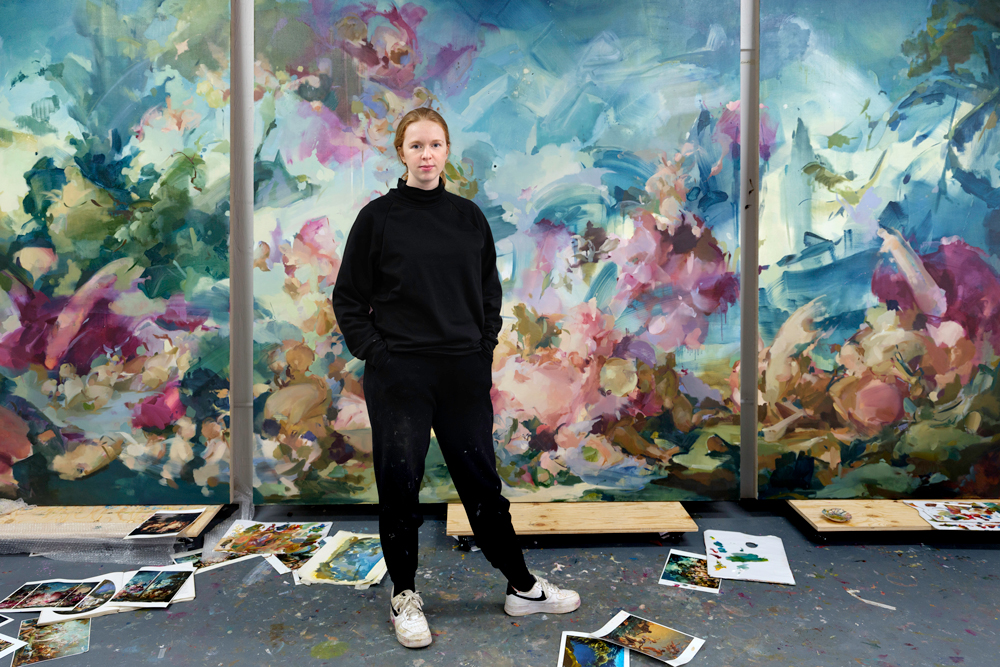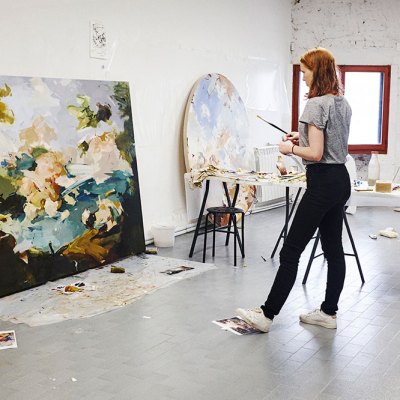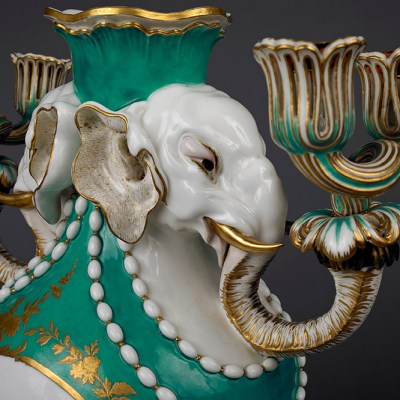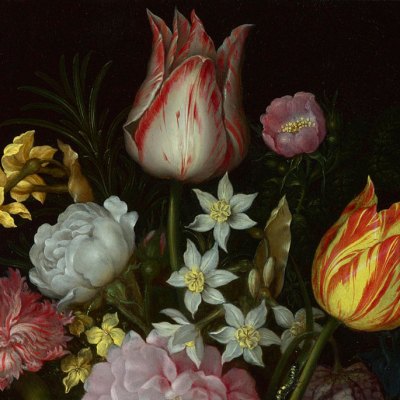Flora Yukhnovich has rapidly risen to renown for her lush, layered paintings that reimagine the rococo through the lens of abstraction. ‘It’s capturing what the sensation of looking at the painting is, rather than its details and what they might mean,’ she told Apollo in 2020, describing the process of synthesising historic pictures in order to create her own. For her exhibition at the Ashmolean Museum in Oxford (until 14 January 2024), Yukhnovich has created a series of large canvases that draw from the Dutch and Flemish still lifes in the museum’s collection.
Where do you work?
My studio is in Bermondsey, London in a place called the Biscuit Factory. Every building has a name like Bourbon or Almond and relates to biscuits in some way, which I quite like. I have a studio at the top of the building with great skylights and windows all the way around – you can see across London. I love it.
How would you describe the atmosphere of your studio?
Because it’s so high up, it’s very peaceful. The atmosphere I try to create is one of meditation and thoughtfulness, I suppose, as I’m always painting alone in here. There’s an overwhelming silence in the space (except when it’s raining, which is very loud). I can see seagulls’ feet as they land on the pitched glass roof and hear them squeak as they slide down it, which always cheers me up.
Teeth (2023), Flora Yukhnovich. Photo: courtesy the artist and Victoria Miro; © Flora Yukhnovich

Do you have a specific daily routine?
I’m most productive in the morning and evening, so I try to be there for a long period of time. First, I like to have a cup of coffee while I’m looking at the work and think about what I’m going to do. I get my admin out the way, then I start painting – that’s when time becomes a bit of a blur.
Is there anything that frustrates you about the studio?
The access isn’t very large, so if I’m making a large work, I have to take it off the structure, roll it up, take it elsewhere and then reconstruct it, which is frustrating. But I love the space.
What do you listen to while you work?
I need to listen to something, as otherwise I feel alone for too much of the day. I’ll listen to podcasts if I’m doing quite manual tasks, such as painting grounds. I listen to music as a way of regulating my mood: if I’m feeling a bit lazy, I’ll listen to something upbeat. Or sometimes, if I paint a section that I feel has gone really well, I’ll listen to the same song on repeat to try to hold on to the mood I was in when I painted it. I listened to Handel’s ‘Sonata for Oboe & Piano, 1st Movement’ on repeat for four days while I was painting Out of the Strong Came Forth Sweetness (2019). It ended up at the top of my Spotify top-played tracks that year.
A Vase of Flowers (1680), Jan Weenix. Photo: © Ashmolean Museum, University of Oxford

What’s the most unexpected object in your studio?
I have a very big stack of bridal magazines that I sometimes use for my work. I’ve been looking at Dutch still lifes – and particularly flower paintings – for the exhibition at the Ashmolean. But I was including flower motifs in my work before that, and bridal magazines have so many shots of bouquets and flower arrangements. The magazines are tied in with the feminine performance of the wedding day, so they’re perfect source material. I’ve got a bit of an archive of them now, going back to 2016.
The Ashmolean has a room of Dutch still lifes, and as I knew I was going to be working for quite a long time on these paintings [for the ‘Ashmolean Now’ exhibition], I wanted to respond to the genre as a whole rather than to a single work. I used that room as a jumping-off point for looking at flower paintings more generally, relating them to horror films to do with monstrous women and to the idea of coming of age. The flowers became a metaphor for the female body.
I Might Have Known it Would Be Red (2022), Flora Yukhnovich. Photo: courtesy the artist and Victoria Miro; © Flora Yukhnovich

What’s the most well-thumbed book?
I don’t know about ‘well-thumbed’ exactly, but I do have books that I keep open – they will have one page that’s thick with paint, because I always have them open under paintings. I’ve currently got books on Joan Mitchell, Rubens and Jenny Saville that have been absolutely covered. I need to get new copies so I can actually see the images again. The Rubens book is open on a classical scene full of tumbling bodies. The Mitchell piece is very rhythmic – I was looking at it for the pacing of the paintings – and Saville was to do with damaged skin and ways of painting traumatised bodily surfaces. So they’re all about the heft of flesh, the pace of painting, skin and the corruption of skin.
Who is the most interesting visitor you’ve ever had?
My friends Robert Cooper and Kate Dunn, who are both artists. When they come to the studio, we’ll do crits that I always find very valuable – they cut to the heart of everything and say the brutal things that need to be said. Oh, and once a photographer from The Sun came round to take photos of the train tracks from above.
‘Ashmolean Now: Flora Yukhnovich x Daniel Crews-Chubb’ is at the Ashmolean Museum in Oxford until 14 January 2024.



